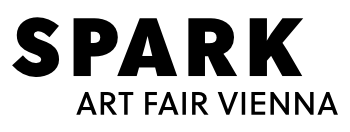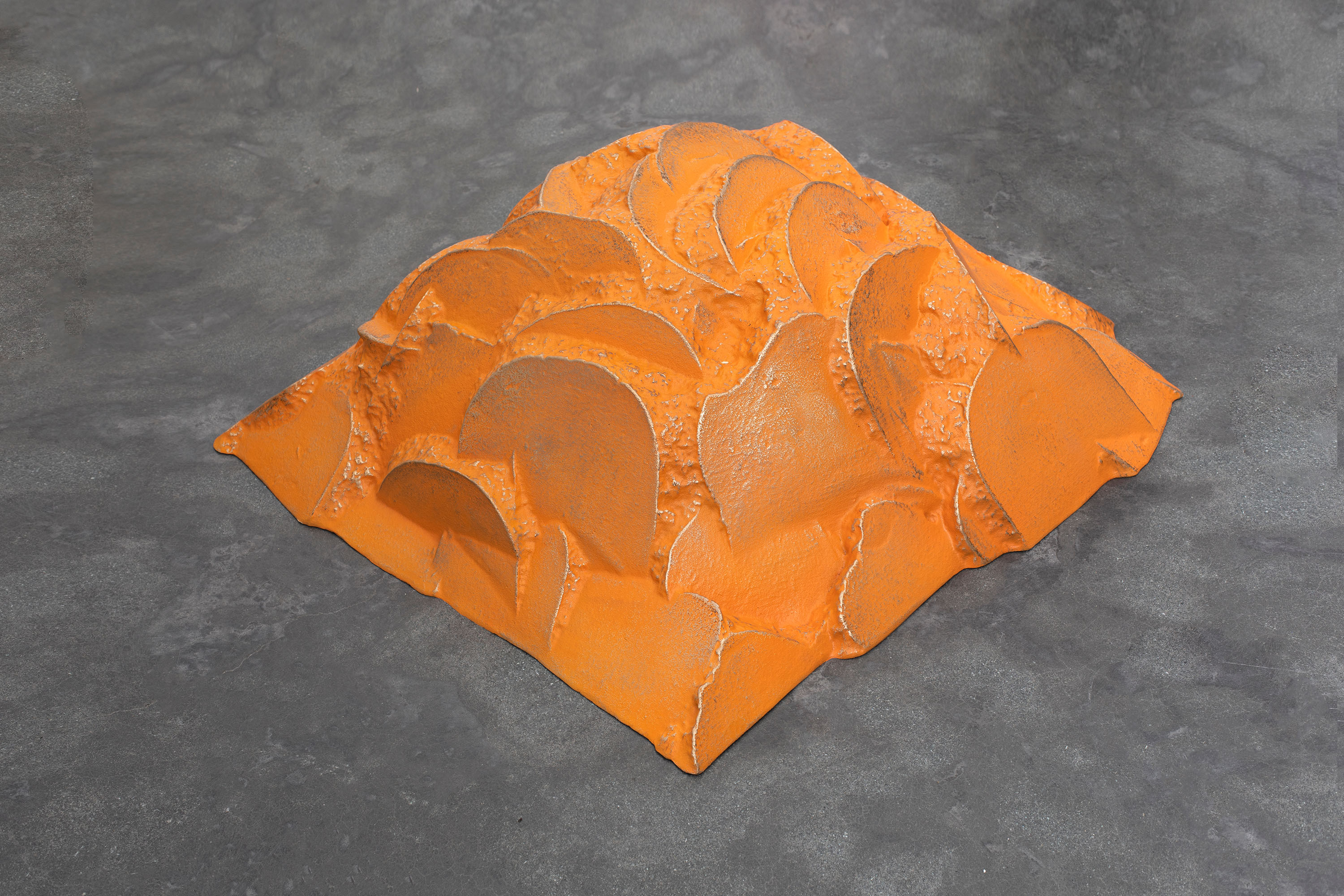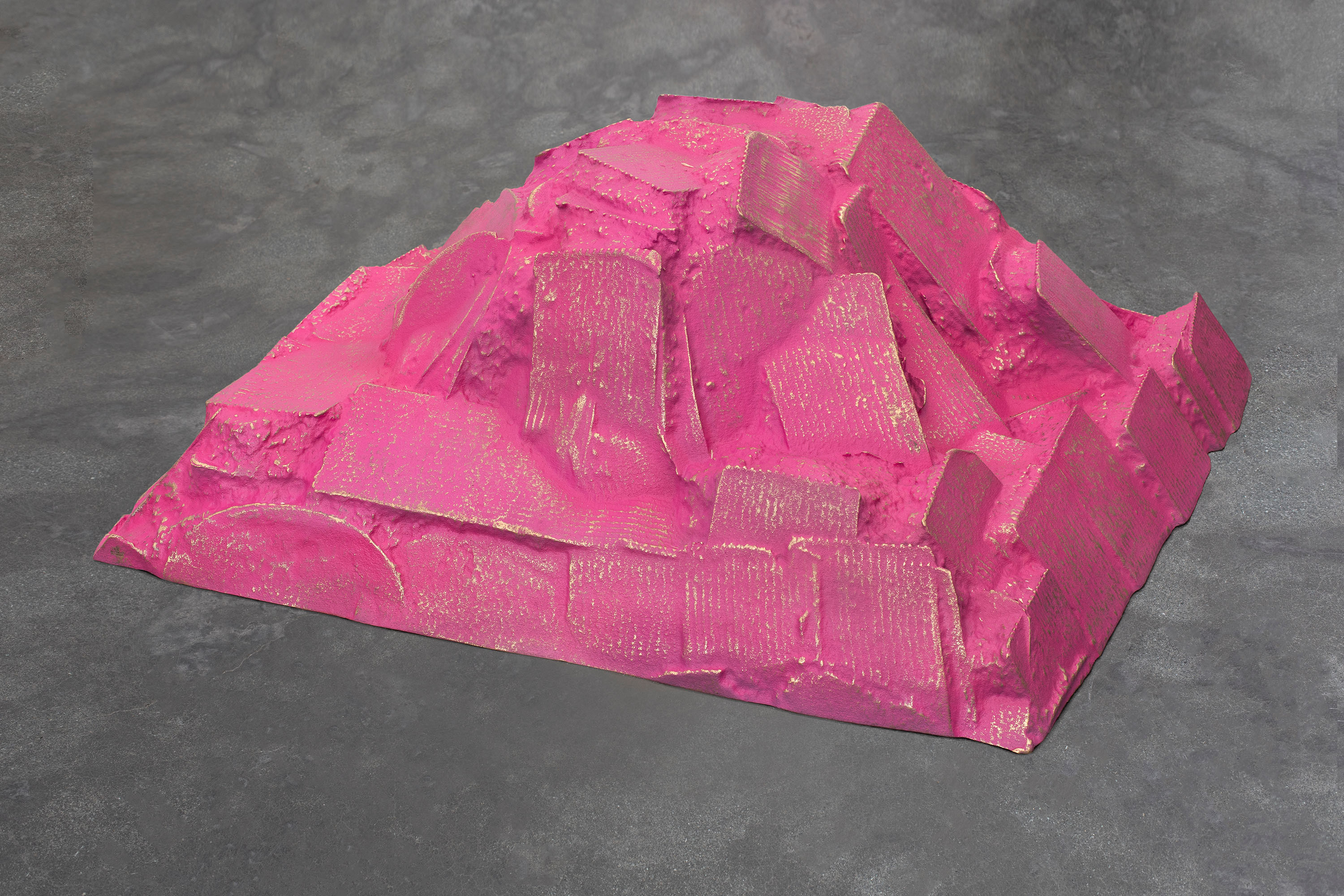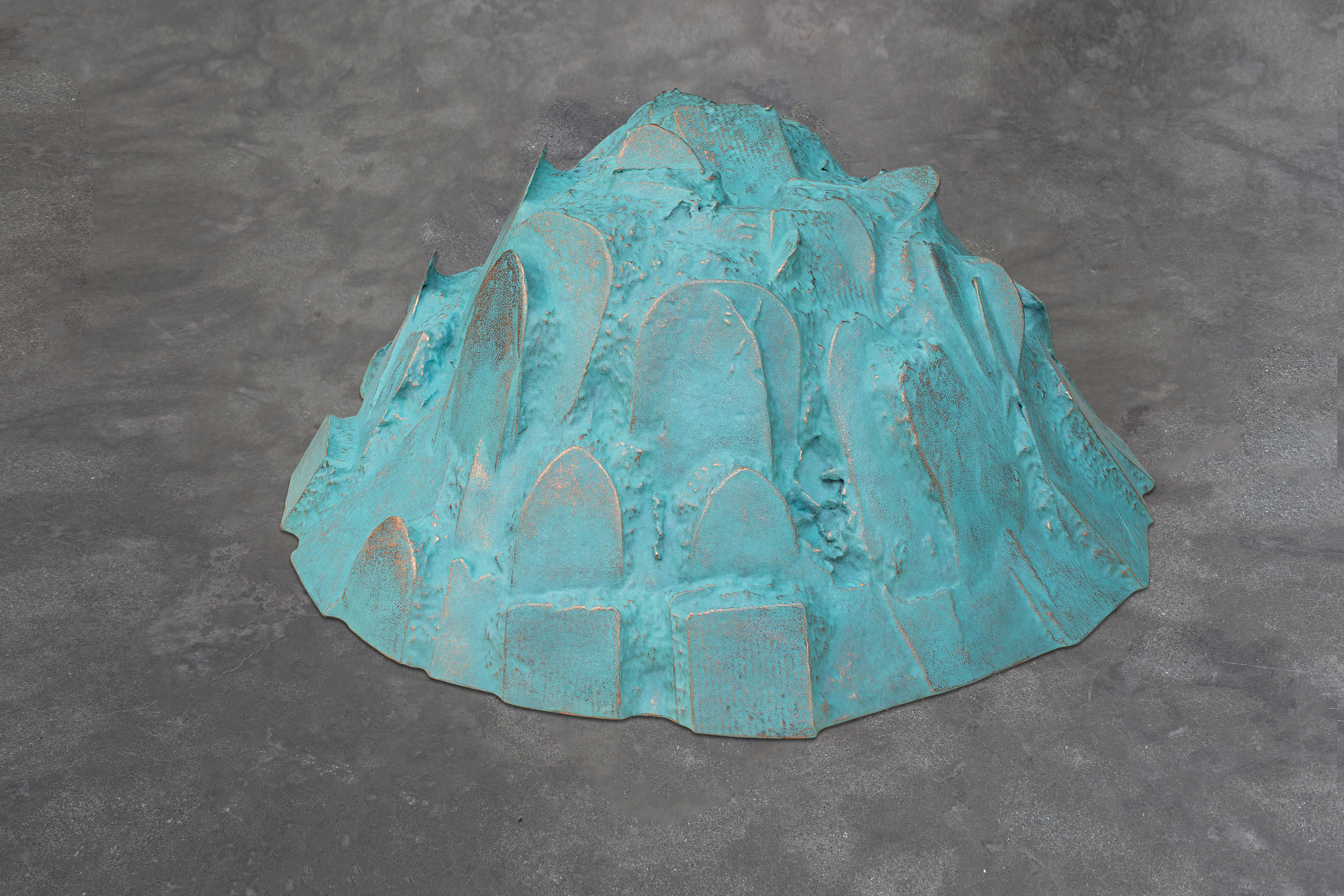Dirimart
Ayşe Erkmen
Ayşe Erkmen, whose practice, and in particular, site-specific works are etched in memory, takes the social and physical environment that she is in as a starting point and by repositioning the existing structure in her particular style, impels viewers to think about space. Her works, which make spaces experiential, do not exhibit a concern for forming a formal language. Instead, the artist invites her viewers to engage in a dialogue with the physical, visual, social, and psychological dimensions of environments, such as museums, gallery windows, exhibition spaces, parks, rivers, and squares.
Individually patinated in bright colors, the sculptures are dispersed in an open arrangement on the black industrial parquet of the gallery, forming a landscape of little hills in strong contrast with the floor. The title of each sculpture is assembled via a color code from the Pantone system and the ancillary not the color it is. This addition refers to the process in which the bronzes are given their final appearance, passing through different shades and leaving the outcome in limbo until the final station. Therefore each sculpture stands on its own, while being held part of the whole ensemble by the shared part of the title.
Biography
Ayşe Erkmen (b.1949, Istanbul) graduated from the Department of Sculpture, Mimar Sinan University in 1977. In 1993, she participated in the DAAD International Artist Residency Programme in Berlin. Erkmen worked as the Arnold Bode Professor at Kassel Art Academy in 1998–1999, as lecturer at Frankfurt Städelschule in 2000–2007 and at Münster Kunstakademie in 2008–2016. Among the international exhibitions Erkmen has participated in are the 2nd, 3rd and 13th Istanbul Biennial; the Turkish Pavilion at the 54th Venice Biennale; Manifesta 1, Shanghai, Berlin, Gwangju, Sharjah, Limerick, Scape, Ichihara, Aicihi biennials; and the Folkestone and Echigo-Tsumari triennials. Her recent shows include Beethoven Bewegt, Kunsthistorisches Museum, Vienna (2020); Whitish, Arter, Istanbul (2019); Kıpraşım Ripple, Dirimart, Istanbul (2017); A, SMAK, Ghent (2016); Une histoire, art, architecture et design, des années 80 à aujourd’hui, Centre Pompidou, Paris (2014); Ayşe Erkmen: Intervals, Barbican Center, London (2013). Erkmen participated in the Skulptur Projekte Münster 2017 with a project titled On Water and in the first edition of the Yorkshire Sculpture International 2019 with her project three of four. In 2020, she is granted the prestigious triennial Ernst Franz Vogelmann Sculpture Award, the first woman artist receiving it. She lives and works in Berlin and Istanbul.
Dirimart
Celebrating its 22nd year in 2024, Dirimart is more focused than ever on challenging and revitalising the existing gallery model in Istanbul. Founded in 2002 by Hazer Özil with the intent of exhibiting established and emerging artists both from Turkey and around the world in a context conducive to critical dialogue and cross-pollination, the pivotal concern of the gallery’s program is individual and regional differences while fostering cosmopolitanism and collaboration.
Dirimart cultivates a program premised on conceptualism, political resistance and intellectual rigour. Located in two distinct locations in Beyoğlu, Dolapdere and Pera, the gallery divides its program between established artists, such as Ayşe Erkmen, İnci Eviner, Canan Tolon, Nuri Bilge Ceylan, Sarah Morris, Anselm Reyle, Jorinde Voigt, Tomokazu Matsuyama, and Karin Kneffel and emerging artists, such as Çiğdem Aky, Çağla Ulusoy, Berke Yazıcıoğlu, and Ebru Duruman. The gallery, through Dirimart and RES Publications (est. 2007), also continues its well-established series of catalogues, artist books and books on art theory.
+902122326666
Dilara Altuğ
+902122326666
Ayşe Erkmen
Ayşe Erkmen, whose practice, and in particular, site-specific works are etched in memory, takes the social and physical environment that she is in as a starting point and by repositioning the existing structure in her particular style, impels viewers to think about space. Her works, which make spaces experiential, do not exhibit a concern for forming a formal language. Instead, the artist invites her viewers to engage in a dialogue with the physical, visual, social, and psychological dimensions of environments, such as museums, gallery windows, exhibition spaces, parks, rivers, and squares.
Individually patinated in bright colors, the sculptures are dispersed in an open arrangement on the black industrial parquet of the gallery, forming a landscape of little hills in strong contrast with the floor. The title of each sculpture is assembled via a color code from the Pantone system and the ancillary not the color it is. This addition refers to the process in which the bronzes are given their final appearance, passing through different shades and leaving the outcome in limbo until the final station. Therefore each sculpture stands on its own, while being held part of the whole ensemble by the shared part of the title.
Biography
Ayşe Erkmen (b.1949, Istanbul) graduated from the Department of Sculpture, Mimar Sinan University in 1977. In 1993, she participated in the DAAD International Artist Residency Programme in Berlin. Erkmen worked as the Arnold Bode Professor at Kassel Art Academy in 1998–1999, as lecturer at Frankfurt Städelschule in 2000–2007 and at Münster Kunstakademie in 2008–2016. Among the international exhibitions Erkmen has participated in are the 2nd, 3rd and 13th Istanbul Biennial; the Turkish Pavilion at the 54th Venice Biennale; Manifesta 1, Shanghai, Berlin, Gwangju, Sharjah, Limerick, Scape, Ichihara, Aicihi biennials; and the Folkestone and Echigo-Tsumari triennials. Her recent shows include Beethoven Bewegt, Kunsthistorisches Museum, Vienna (2020); Whitish, Arter, Istanbul (2019); Kıpraşım Ripple, Dirimart, Istanbul (2017); A, SMAK, Ghent (2016); Une histoire, art, architecture et design, des années 80 à aujourd’hui, Centre Pompidou, Paris (2014); Ayşe Erkmen: Intervals, Barbican Center, London (2013). Erkmen participated in the Skulptur Projekte Münster 2017 with a project titled On Water and in the first edition of the Yorkshire Sculpture International 2019 with her project three of four. In 2020, she is granted the prestigious triennial Ernst Franz Vogelmann Sculpture Award, the first woman artist receiving it. She lives and works in Berlin and Istanbul.
Dirimart
Celebrating its 22nd year in 2024, Dirimart is more focused than ever on challenging and revitalising the existing gallery model in Istanbul. Founded in 2002 by Hazer Özil with the intent of exhibiting established and emerging artists both from Turkey and around the world in a context conducive to critical dialogue and cross-pollination, the pivotal concern of the gallery’s program is individual and regional differences while fostering cosmopolitanism and collaboration.
Dirimart cultivates a program premised on conceptualism, political resistance and intellectual rigour. Located in two distinct locations in Beyoğlu, Dolapdere and Pera, the gallery divides its program between established artists, such as Ayşe Erkmen, İnci Eviner, Canan Tolon, Nuri Bilge Ceylan, Sarah Morris, Anselm Reyle, Jorinde Voigt, Tomokazu Matsuyama, and Karin Kneffel and emerging artists, such as Çiğdem Aky, Çağla Ulusoy, Berke Yazıcıoğlu, and Ebru Duruman. The gallery, through Dirimart and RES Publications (est. 2007), also continues its well-established series of catalogues, artist books and books on art theory.
ABOUT Dirimart




